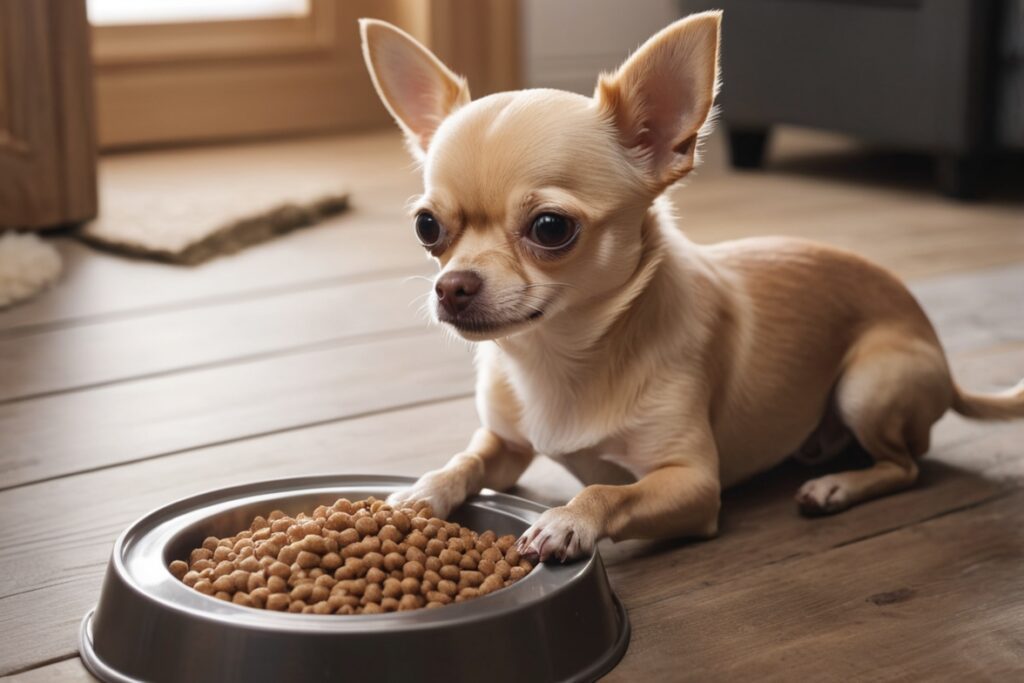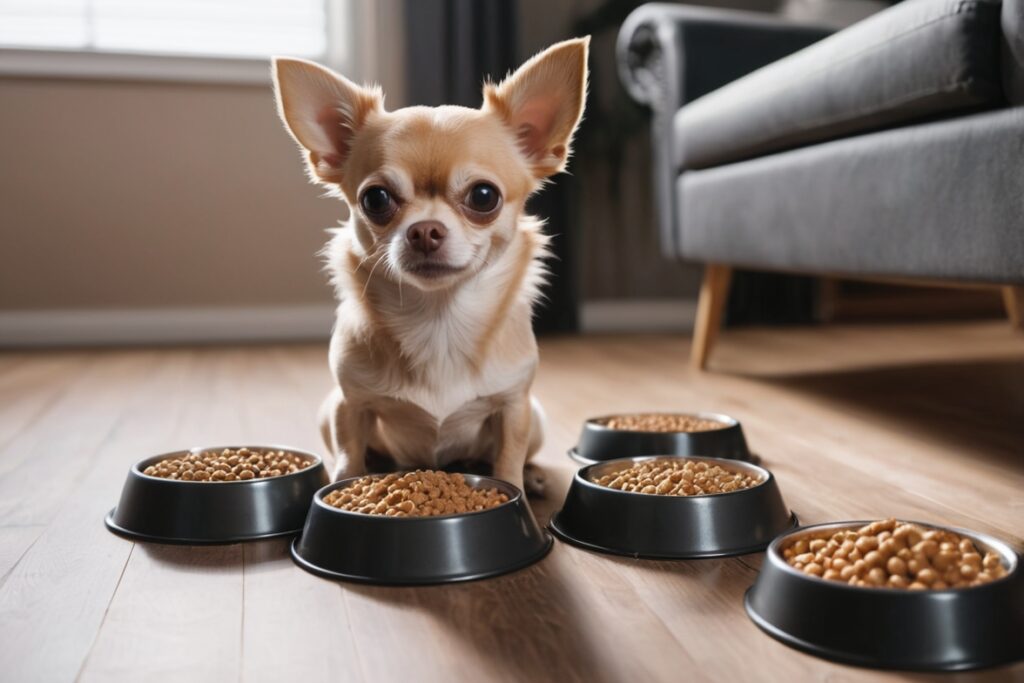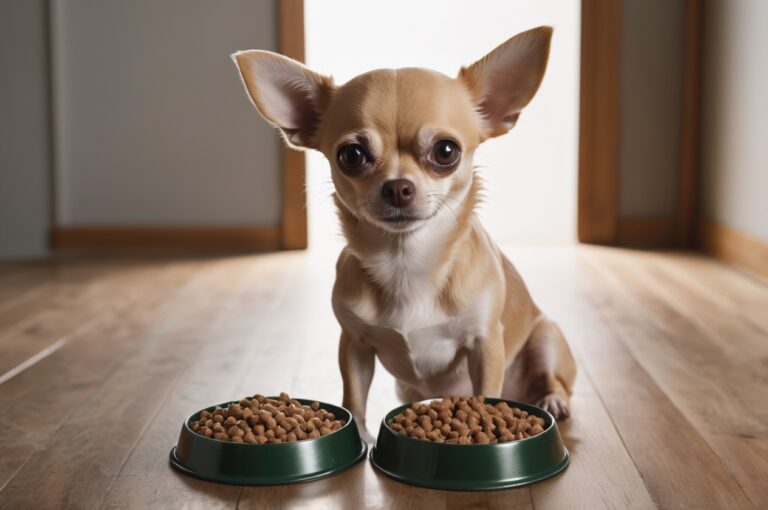Feeding Your Chihuahua: Optimal Portions, Schedule, and Top Food Choices

Feeding a Chihuahua requires careful attention to portion sizes, meal timing, and nutritional quality due to their small size and fast metabolism. Proper feeding helps maintain their energy levels, prevents common health issues, and supports their overall well-being. Understanding how much to feed, when to feed, and what types of food work best can ensure a balanced diet tailored to their specific needs.
1. Determining the Right Portion Size for Your Chihuahua
Finding the right portion size for a Chihuahua is essential, as overfeeding or underfeeding can impact their health. Their small bodies require nutrient-dense meals, and even small amounts of extra food can lead to weight gain. On the other hand, insufficient portions can leave them feeling weak or lethargic.
1.1 General Portion Guidelines
For adult Chihuahuas, portion sizes typically range between ¼ and ½ cup of food per day. This amount may vary based on factors like age, weight, and activity level. Puppies often need more frequent, smaller portions to support their growth, while senior Chihuahuas may require less to avoid weight gain. Dividing this daily portion into multiple meals helps regulate their metabolism and keeps them energized throughout the day. Adjusting portions based on their specific needs ensures that they maintain a healthy weight.
1.2 Adjusting Portions by Activity Level
A Chihuahua’s activity level significantly influences their ideal portion size. More active Chihuahuas, especially those involved in agility or daily play sessions, may need slightly larger portions to fuel their energy expenditure. Less active or sedentary Chihuahuas may require smaller portions to avoid excess calorie intake. Monitoring their energy levels and body condition helps determine whether to increase or decrease portions, keeping them at a balanced weight. Adjustments should be made gradually to avoid sudden dietary changes that could upset their stomach.
1.3 Weight and Age Considerations
Weight and age are critical factors when deciding on portion sizes for Chihuahuas. Puppies, due to their fast growth rate, need nutrient-dense meals with slightly larger portions relative to their size to support bone and muscle development. Adult Chihuahuas benefit from a balanced portion size that maintains their weight without encouraging obesity. Senior Chihuahuas often have slower metabolisms and may need reduced portions to prevent weight gain. Monitoring their weight regularly and adjusting portions accordingly helps keep them within the ideal weight range for their age and body type.
1.4 Signs of Overfeeding or Underfeeding
Understanding the signs of overfeeding or underfeeding is essential for managing a Chihuahua’s diet. Overfed Chihuahuas may appear rounder, with a noticeable layer of fat, and could become less energetic. Signs of underfeeding include visible ribs, low energy levels, and a tendency to scavenge for food. Observing these signs and adjusting portions accordingly can help prevent common health issues related to weight imbalance, ensuring the Chihuahua’s diet aligns with their nutritional needs.
| Factor | Ideal Portion Range | Considerations |
|---|---|---|
| Puppies | Slightly higher, split into multiple meals | Supports growth and development |
| Active Adults | Slightly larger portions | Higher calorie needs due to energy expenditure |
| Less Active Adults | Smaller portions | Prevents excess calorie intake and weight gain |
| Seniors | Reduced portions | Adjusts to slower metabolism and lower energy requirements |
2. Establishing a Feeding Schedule for Consistency

A regular feeding schedule helps Chihuahuas maintain consistent energy levels and supports their digestive health. Their fast metabolism benefits from scheduled meals, as irregular feeding can lead to blood sugar fluctuations, especially in smaller Chihuahuas prone to hypoglycemia.
2.1 Ideal Meal Frequency for Puppies and Adults
For puppies, feeding should occur 3-4 times a day due to their high energy needs and fast-growing bodies. Dividing their daily portion into multiple meals helps regulate blood sugar and supports steady growth. Adult Chihuahuas generally thrive on a schedule of 2 meals per day, which maintains consistent energy without overloading their small stomachs. Maintaining consistent mealtimes is crucial for both puppies and adults, as it helps establish a routine they come to expect.
2.2 Benefits of Regular Mealtimes
Setting regular mealtimes offers Chihuahuas a predictable routine, which can reduce anxiety and support a healthy digestive rhythm. Scheduled feeding prevents overeating and makes it easier to detect any changes in appetite, which may indicate health concerns. Consistent timing also helps maintain stable blood sugar levels, particularly important for smaller Chihuahuas with fast metabolisms. By sticking to regular mealtimes, owners can support their Chihuahua’s physical and mental well-being.
2.3 Managing Treats Within the Schedule
While treats are a useful training tool, they should be factored into the overall feeding schedule to avoid excess calorie intake. For Chihuahuas, treats should make up no more than 10% of their daily calorie intake. Offering treats at specific times, such as during training sessions or as rewards for good behavior, helps regulate their intake and prevents unintentional overfeeding. Choosing low-calorie, nutritious treats supports a balanced diet, ensuring that treats enhance training without compromising their health.
2.4 Avoiding Free-Feeding
Free-feeding, or leaving food out all day, is generally not recommended for Chihuahuas due to their small size and tendency to gain weight easily. A scheduled feeding routine allows for better portion control and reduces the likelihood of overeating. Free-feeding can lead to irregular eating patterns and make it difficult to monitor their intake, increasing the risk of weight issues. Instead, offering meals at set times encourages Chihuahuas to eat only what they need, helping maintain a balanced diet and a healthy weight.
This structured approach to feeding, with well-portioned meals and a consistent schedule, provides Chihuahuas with the energy they need while supporting overall health and preventing issues related to overfeeding or underfeeding. Proper portions, regular mealtimes, and mindful treat management create a balanced diet that caters to their unique needs.
3. Choosing the Best Food for Your Chihuahua

Selecting high-quality food is essential for meeting the nutritional needs of Chihuahuas, supporting their energy, health, and longevity. With their small size and specific dietary requirements, it’s important to choose food that provides balanced nutrients, supports digestion, and aligns with their life stage.
3.1 Nutrient Requirements for Chihuahuas
Chihuahuas benefit from a nutrient-dense diet tailored to small breeds. Their food should contain high-quality protein as the primary ingredient, which supports muscle maintenance and overall vitality. Additionally, they need healthy fats, like omega-3 and omega-6 fatty acids, to support coat health and joint flexibility. Essential vitamins and minerals, such as calcium, iron, and zinc, are also critical for their growth, immune system, and overall health. Choosing food that meets these nutrient requirements ensures they get the right balance for their small but active bodies.
3.2 Dry vs. Wet Food Options
When it comes to choosing between dry kibble and wet food, both have unique benefits. Dry kibble is convenient, supports dental health by reducing plaque buildup, and generally has a longer shelf life. Wet food, on the other hand, is often more palatable and hydrating, making it a good option for Chihuahuas that struggle with dry food or need additional moisture. A combination of both dry and wet food can be beneficial, offering the dental benefits of kibble with the enhanced taste and hydration of wet food. The choice depends on the Chihuahua’s preferences, dental health, and overall hydration needs.
3.3 Small Breed-Specific Formulas
Chihuahuas benefit from small breed-specific formulas, which are designed to meet the needs of tiny dogs with fast metabolisms. These formulas often have higher calorie content in smaller servings, accommodating their energy needs without overfeeding. The kibble size in small breed formulas is also smaller, making it easier for Chihuahuas to chew and digest. This tailored approach to their food ensures that they receive the right amount of nutrients in portions suited to their small size, supporting both health and ease of eating.
3.4 Avoiding Harmful Ingredients
Certain ingredients should be avoided in Chihuahua diets due to potential health risks. Low-quality fillers like corn and soy provide little nutritional value and can lead to digestive issues or allergies. Artificial additives, such as colors, flavors, and preservatives, may cause sensitivities and are generally unnecessary in a balanced diet. Opting for food with natural ingredients and minimal processing helps avoid these harmful substances, ensuring Chihuahuas receive wholesome nutrition that supports their well-being without added risks.
4. Monitoring Your Chihuahua’s Health and Weight

Consistent monitoring of a Chihuahua’s health and weight is vital for detecting changes that may indicate dietary adjustments or health concerns. Regular observation and vet checkups ensure that they are maintaining a healthy weight and receiving the necessary nutrients.
4.1 Regular Weight Checks
Regularly checking a Chihuahua’s weight is important, as even small fluctuations can indicate overfeeding, underfeeding, or health issues. Weighing them every month helps track any changes and provides a basis for adjusting portion sizes if needed. If weight gain or loss occurs, examining their diet and activity level allows for adjustments that support a balanced weight, keeping them within the recommended range for their size and age.
4.2 Observing Energy and Behavior
A Chihuahua’s energy levels and behavior can offer insights into their diet’s effectiveness. A well-fed, healthy Chihuahua is typically active, playful, and alert. Low energy or unusual lethargy may indicate that their diet is lacking in nutrients, while hyperactivity or digestive issues can signal an excess of calories or poor-quality ingredients. Regularly observing their behavior and noting any changes can help determine if their diet needs adjustments to better support their health.
4.3 Routine Vet Checkups
Routine veterinary checkups are essential for monitoring a Chihuahua’s overall health and ensuring that their diet supports their unique needs. During checkups, vets can assess their weight, body condition, and any signs of nutrient deficiencies or health issues. Vet visits also provide an opportunity to discuss any dietary changes or health concerns and to receive professional guidance on managing their diet as they age or face changing health conditions.
4.4 Adjusting Diet with Age and Health Changes
As Chihuahuas age, their nutritional needs may change. Puppies require nutrient-dense food for growth, adults need balanced maintenance diets, and seniors often benefit from reduced calorie intake to prevent weight gain. Health changes, such as developing joint issues or dental problems, may also necessitate adjustments in their diet. Switching to senior-specific formulas or offering softer foods as they age ensures their diet continues to meet their needs and supports optimal health at every stage.
FAQ
Q1: How can I tell if I’m feeding my Chihuahua the right amount?
Monitoring their weight and body condition is key. If they maintain a healthy weight, appear active, and have a good appetite, the portion size is likely appropriate. Adjusting as needed based on weight changes or energy levels helps keep portions in balance.
Q2: Is dry or wet food better for my Chihuahua?
Both options offer benefits. Dry kibble aids dental health by reducing plaque, while wet food provides hydration and is often more palatable. Many owners find a combination of both best supports their Chihuahua’s preferences and needs.
Q3: What foods should I avoid feeding my Chihuahua?
Avoid foods with artificial additives, fillers like corn and soy, and any human foods that can be toxic, such as chocolate, onions, and grapes. Choosing natural, high-quality dog food supports their health and minimizes exposure to harmful ingredients.






